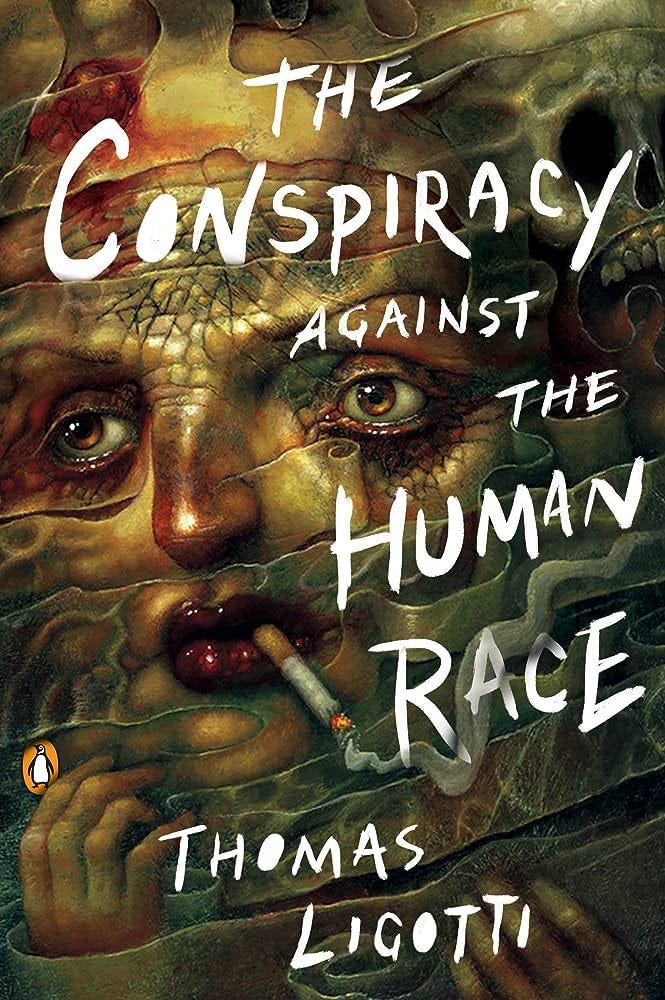Review: The Conspiracy Against the Human Race
How Thomas Ligotti's infamous take on the meaning of life left me hollow inside
I firmly believe that this was one of the most exhausting books I’ve read in my entire life. Although saying something like that could seem negative, I really don’t mean it that way.
The Conspiracy Against the Human Race only comes in at 245 pages. However, the subject matter alone made me feel like I had been reading it for years. Unfortunately (or fortunately?) this was my first read ever by Thomas Ligotti.
I found myself quite infatuated with his wide range of vocabulary, a style that I myself would love to emulate. Ligotti keeps you morbidly hypnotized as you progress throughout the novel. The experience was akin to watching a beautiful church you once attended be slowly engulfed in flames. There’s nothing you can do to stop him from telling you the true horror of consciousness, but you want to keep watching the destruction.
The author’s entire point of this book is to point out the true horror of human nature and showcase the meaninglessness of life.
In case, we the reader, attempt to console ourselves from the truth, Ligotti slaps us in the face with citations from multiple clinically depressed philosophers and explains how we as a species use religion as a coping mechanism.
What I specifically found interesting in this book were the tropes of horror that are all seemingly linked together. The author (who has written multiple horror novels as you may already know) points out that much of what we fear can boil down to the same common fear that we all share as a species. Our consciousness being destroyed.
Death and the infinite nothing hover over our heads every day and we would be foolish to think that we couldn’t pass at any moment.
This is brought up in many different examples throughout the book. Behold:
Then it begins. This can’t be happening, you think—if you can think at all, if you are anything more than a whirlwind of panic. In reality, though, anything can happen now. This is the whispering undercurrent that creeps into your thoughts—nothing is safe and nothing is off limits. All of a sudden something was set in motion that changed everything. Something descended upon you that had been circling above your life from the day you were born. And for the first time you feel that which you have never felt before—the imminence of your own death.
Oddly enough the constant reminder that we will die one day and that all we are is shadows and dust in the end seeks to calm us. I’m not trying to be macabre but in my opinion, it helps one to live in the moment and enjoy the fruits that life has to offer us. My reasoning is that maybe it helps us to realize that the job we didn’t get, the date that stood us up, or the mechanic that overcharged us for a simple oil change don’t really matter in the end because we are all inevitably met by the great equalizer.
In fact, the more I think about this book, the more I like it.
It doesn’t seem that many others feel the same though. After scouring the book’s reviews online, I see that many professional reviewers did enjoy it and described it as being one of the best books of 2010. Many other comments I saw on Reddit and elsewhere exclaimed that the book was ‘unreadable’ or that they ‘only read bits and pieces of it’.
I can understand where they are coming from. You can only permit an author to beat you over the head with a club of depression for so long until you’re mentally taxed to do anything else for the rest of the day. Hence why I felt as though I was reading this book for years.
But the book is a feast for the most pessimistic of us as I imagine most fan of Ligotti are wanton to do.
Even though this book is more than a decade old I felt the timelessness of the subject matter, as Ligotti references multiple obscure philosophers and digs deep on the subjects of metaphysics, literature, and neuroscience. Lovecraft is mentioned a few times in the novel as Ligotti draws inspiration from his dim worldview and pessimistic endings. Edgar Allen Poe, Thomas DeQuincy, and Ann Radcliffe are also referenced a time in his book.
What most resonated with me after ingesting Conspiracy, was how inescapable each and every one of our fates are. Ligotti points out the futility of healthy living, having children in an attempt to achieve a false sense of genetic immortality, and how very few of us seek to escape the horror that is human consciousness by striving toward ego death.
Consciousness is horror.
That is the main message this book delivers. We’re cursed as conscious living beings to live with the fact that someday we will die. We can try to distract ourselves with our reality TV, heading to the gym, or buying a plane ticket to Hawaii, but inevitably we will all meet our maker.
When an author can strip away that protective layer of tissue of your brain that tries in vain to stop you from thinking about the infinite blackness that awaits each and every one of us, that is telling of how good the author really is.
Of course, in time Ligotti’s works will fade away in time as I’m sure he cares little upon that realization. But The Conspiracy Against the Human Race will stick with me as a constant reminder that the horror that is waking consciousness and my looming demise will be ever present in the back of my mind.
Time for a drink.
-OT




